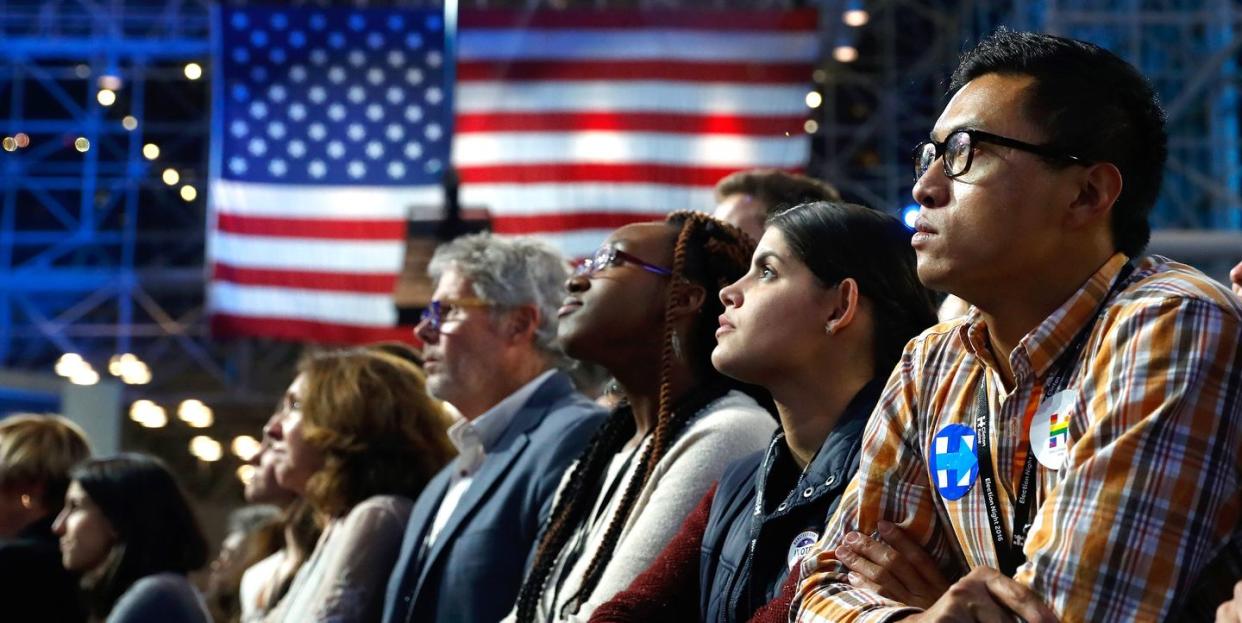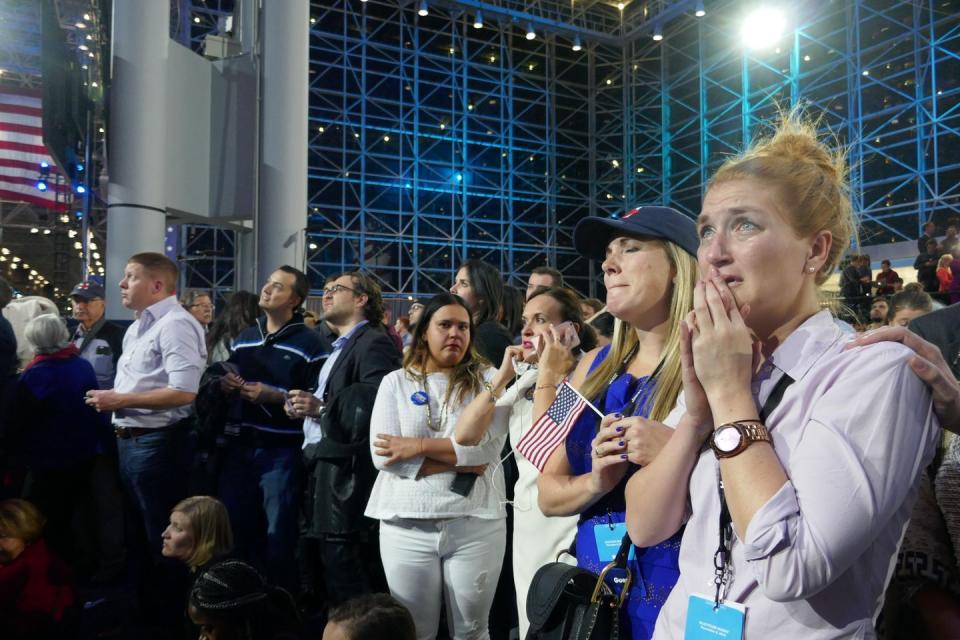After 2016, People Are Rethinking How They'll Spend Election Night This Year

Ask me what I was doing on November 7, 2016, and I’d shrug. Another day lost to the march of my life. But November 8 remains vivid, a montage that has gotten far too many replays: The morning stroll to the polls before catching the subway to work. The margaritas at a Mexican restaurant in Queens. The glimpse of Florida’s returns on the TV screen as we left.
For me, as for many others, the day of the 2016 presidential election is completely unforgettable. “It’s like the JFK assassination or 9/11,” Robert McClellan, podcast host and author of Leaving Trump’s America, tells OprahMag.com.
The day also contained a personal crossroads for McClellan: He and his wife, cave diver Jill Heinerth, decided to relocate to her native Canada the following morning. McClellan had sensed a change in his rural north Florida neighborhood in the months leading up to the election. The Bernie Sanders sign in their driveway had only lasted a day before it had been riddled with bullet holes.
“My neighbors were becoming radicalized. When they found out that I had combat experience, they wanted me to train with them and join their militia,” McClellan, a veteran, recalls, referring to attempts by armed vigilante groups to show up at protests and polls back in 2016. "And I was like, 'I don’t think so. You guys are a bunch of knuckleheads running around in the woods.'"
A year later, the couple packed up their home in Florida and bought a condo in Canada. “If you asked my wife, she’d say I’m a new man. I’m brighter, happier, younger—and I'm not stressed out,” McClellan says.
The 2016 election is an example of a “flashbulb memory,” or one that many individuals hold about the same striking event. The term was coined in 1977 by Roger Brown and James Kulik while investigating memories of the JFK assassination.
“Often, they are things that we don’t experience directly ourselves, but learn about and are aware of in a way that surprises or shocks us,” K. Andrew DeSoto, an expert in collective memory, explains to OprahMag.com. Other common examples are the death of Princess Diana in 1997, or the televised Challenger explosion in 1986. DeSoto credits the surprise of the 2016 election with its stickiness in people’s minds. “Many individuals had their expectations shattered by those events, contributing to the memorability of it,” DeSoto says.
Some have especially unique stories associated with election day 2016, like Jessica Liebfried, a nursing student from Minnesota who voted while in labor with her daughter, Rosie (named for the Riveter). “My dad drove me to the polls, and I could barely move. It’s something I’ll think about every time we have a presidential election,” Liebfried, 40, says. Or Holly Smith, who was unplugged on a flight from Zurich to Boston after three months in Europe. “That was the most intoxicated I ever got on a plane. I spent that whole flight thinking about the election,” Smith, a Cleveland-based counselor, remembers.
Now, as Americans create plans for how to spend the evening of November 3, 2020, they have several unexpected elements to deal with that are quite different from four years ago: The coronavirus pandemic, the widespread use of mail-in voting (creating a likely delay in results), the threat of election-related violence by armed citizen militia groups, and the potential for the president to refuse to commit to a peaceful of transfer of power in the event Joe Biden wins. The negative emotions associated with the 2016 election plus this new normal have meant many voters are rethinking how they’ll spend election night.
Bartender Christopher Ruiz, for example, definitely won’t be working a shift at a bar in Mobile, Alabama, as he was in 2016. “I made an Old Fashioned and stepped to the back for 10 minutes to drink it. Told the manager I needed some time,” Ruiz, 32, recalls of watching the results come in. This November 3, Ruiz, who has since relocated to Vermont, will be spending the night in with family—and the news will be turned off. “I at least want to be in a loving moment with family,” he said. “I’m going to take a breath before the storm hits, so to say.”
Four years ago, David Weissman was also in a bar—but instead, in Jerusalem, cheering on Trump’s victory along with other American Republicans. “It’s like a sports team, when your guy wins—that’s what it felt like. Trump represented what I believed in at the time. Now I wonder: What the heck was I thinking?” Weissman says. Following his ideological turnaround, this year Weissman will work as a poll greeter with his local Democratic party volunteer organization, and will cast his vote for Joe Biden.
For some citizens, voting no longer feels like a sufficient exercise of civic duty—which is what led Meghan McCormick, a 34-year-old creative recruiter from Brooklyn, to volunteer as a poll worker for the first time in her life. Four years ago, McCormick wore matching pantsuits with her coworkers to support Hillary Clinton. This year, she’s placing more emphasis on her individual role in the democratic process than the outcome of the election.
“I’m feeling excited to show up in a way that means participation,” McCormick says. “I won't change the direction of the election, but I feel more accountable to being a citizen.” In doing so, McCormick hopes to avoid the emotional swings she felt in 2016. “I’m taking action to avoid feeling blindsided—it’s my defense mechanism to avoid feeling completely shattered."
Based on her experiences, McCormick also plans to take off the day after the election. “I wanted to release myself from the pressure of showing up,” she says.
Whether or not to show up is a question many are asking themselves. Maris Costa, a 41-year-old office manager in the Bronx, decided to take the week of the election off to avoid an experience like 2016’s. Back then, Costa—who is Black and Puerto Rican, and a minority in her office—found herself assuaging her white colleagues the morning after Trump’s victory. “They wanted to word vomit about who their parents voted for, and why that didn't necessarily make them a bad person. I guess they wanted to get reassurance from me. But I was like, ‘You haven’t asked me how I'm doing,’” Costa recalls.
This year, Costa is stockpiling rom-coms and Levain cookies for a staycation, which marks the first time she’s ever used PTO for an election. “I’m giving myself the space to process and to feel my feelings once, and to not do the extra emotional labor of managing other people’s emotions,” she says.
Others will be searching for community. T Kira Madden, professor and author of Long Live the Tribe of Fatherless Girls, let her students at Sarah Lawrence College’s MFA program decide whether to cancel class on the Tuesday of the election. “I wanted them to have the option to vote for class if they were looking forward to it as a safe haven to process,” Madden says. But they voted unanimously to cancel, which Madden called a “relief,” given her experiences in 2016—she left her own election party and “grieved” at Manhattan’s Stonewall Inn. “I wasn't sure any of us would be able to pay attention.”
Bar owner Laura Dierks, unlike most, would love to repeat the same election day routine she had four years ago, surrounded by a crowd in a bar—but it’s impossible. In 2016, Dierks was hosting an election party at Interboro Spirits & Ales, her distillery in Brooklyn, which had just opened three weeks prior. One of many small businesses impacted by the coronavirus pandemic, Interboro was closed to customers between March and September. “It’s been very, very difficult,” the entrepreneur and mother-of-three says.
Now, Dierks plans to gather friends and patrons at her bar under New York’s restrictions of limiting establishments to 25% occupancy. “It’s going to be quieter, but I want to have as many people there as we can.” For Dierks, camaraderie is crucial for having a positive experience on election night. “Setting the stage for it to have good memories, regardless of the outcome, is really in my head.”
Though Dierks will be surrounded by others, spending election night in a social environment isn’t a viable option for many due to COVID-19. Based on her experiences in 2016, comedy writer Jill Twiss isn’t sure she’d want to spend the night surrounded by people; four years ago, while attending Hillary Clinton’s victory party in New York's Javits Center, she watched as the mood changed from fervent excitement to fear.

“I’ve tried to avoid thinking about that night. A big part of me doesn't want to admit that I was traumatized by 2016. I want to be able to say, 'I was fine,’” Twiss says. So this year, she’ll be alone—deliberately so. “I hope to do something that’s pleasant to create a pleasant memory,” she adds. Ultimately, she isn’t sure how to “protect herself” from the election’s outcome—but she says she can protect her health.
Jandra Sutton, who spent election day in 2016 having a panic attack in her bathroom, is working with her therapist to develop a plan to avoid emotional spirals on election day, regardless of the outcome. Most essentially? She’s not watching the news.
“Every other election, I watched the news like it was a dog race,” Sutton, a 31-year-old founder of a creative agency based in Nashville, says. “I can’t control the outcome after I’ve already voted and donated. If I’m just staring at the news, it's going to get bigger, scarier, and harder. Versus if I say, ‘Ok, I'm going to see the result, and I'm going to handle it ‘x’ way.’”
Sutton says her mom, who usually votes conservative, is feeling equally anxious. While they haven't gotten into political specifics, they've spoken about their shared anticipation, especially as it concerns election night chaos. "I get random text messages mentioning things like, 'Please buy a compass or a paper map,'” Sutton says of her mother's apocalyptic fears.
So come November 3, Sutton will engage in the things she knows will make her feel good, like playing her Nintendo Switch and hanging out with her dogs—or “silly dancing” with her husband, her tactic for avoiding anxiety. “I make him do it. It works,” Sutton says. “It’s like getting a breath of air. I can handle this.”
Of course, the results are very much up in the air. But what is for sure is that the 2020 election—and the days to come—will likely be remembered just as vividly as 2016. DeSoto warns that, while they’re frequently vivid, flashbulb memories aren’t always accurate. So the day of this historic election, he proposes Americans write down a few reflections. “A year down the road, you can think about what your memory of the event is, and compare it to what you wrote in your diary. It’s a way to do a study on yourself,” DeSoto says.
No matter how the election goes—or what your own hopes are—Dierks has a suggestion of her own, which she’ll share with her patrons: “Be careful of drinking your favorite drink, lest it be tarnished by the memory of an association.” Dierks has a point: After splitting a pitcher of margaritas in 2016, I’ve never looked at a salt-rimmed glass the same way again.
For more ways to live your best life plus all things Oprah, sign up for our newsletter!
You Might Also Like

